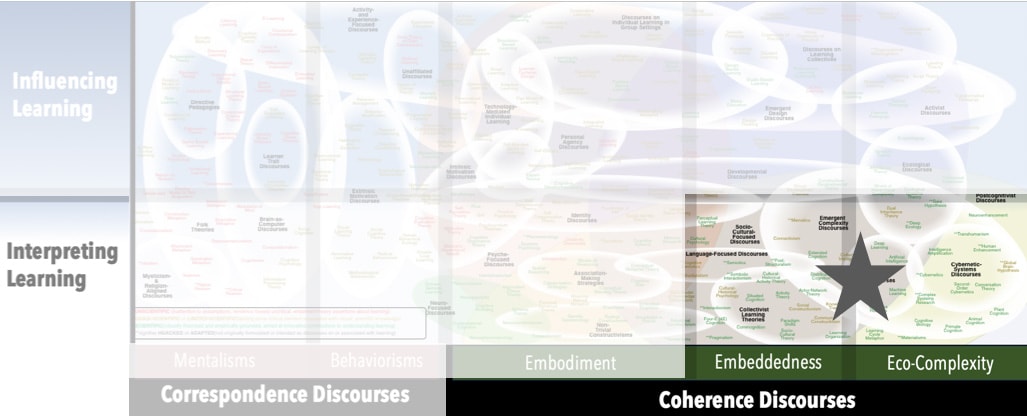Focus
Attending to the co-amplifying possibilities of systems comprising coupled agentsPrincipal Metaphors
- Knowledge is … range of possible activity
- Knowing is … doing, being
- Learner is … a complex system
- Learning is … adapting
- Teaching is … influencing, occasioning
Originated
1950sSynopsis
Most, but not all Emergent Complexity Discourses are explicitly aligned with Complex Systems Research and the phenomenon of Emergence (see below). A uniting theme of Emergent Complexity Discourses is that global behaviors cannot be predicted on the basis of the rules governing the individual agents. Associated constructs include:- Autopoiesis (Humberto Maturana, Francisco Varela; 1970s) – From the Greek αὐτo- “self” + ποίησις “creation,” Autopoiesis is used to describe any system that is able to self-reproduce and self-maintain.
- Emergence – the manifestation of greater organizational and/or behavioral complexity as a whole transcends its parts – that is, when a phenomenon displays properties that its parts do not have
- Postdictable (Postdictability) – a counterpoint to “predictable.” Meaning literally “able to say after” (i.e., Latin post- + dicere combined with English able), Postdictable applies to situations that cannot be precisely foreseen – but that, after having occurred, can be precisely explained.
- Cognitive Complexity Theory – a complexity discourse that is specifically focused on human learning, with prominent associated interests in collective action and technological augmentation of human possibility
- Emergent Evolution – the perspective that species and biological traits arise from, but cannot be reduce to, ancestral sources. That is, evolution is interpreted as trending toward increased complexity.
- Emergentism – broadly speaking, is the embrace of the phenomenon of Emergence (as described above), especially with regard to topics associated with mind and consciousness
- Relational Paradigm (2000s) – a cross-disciplinary movement that is articulated quite differently across domains, but that consistently urges observers to interpret phenomena in terms of dynamic relationships among forms instead of focusing attentions on imagined-to-be-discrete forms. That is, a Relational Paradigm is discourse in which the actions and characters forms/agents are delimited and constituted not by those entities, but by a grander relational web.
Commentary
A useful distinction is often drawn between “complicated” and “complex.” These words have the same etymological roots, but in contemporary parlance, complicated has come to refer to predictable, mechanical phenomena, whereas complex is used to describe more unruly forms. Complicated systems are the subjects of classical Newtonian mechanics. Complicated systems are better characterized in the language of Darwinian dynamics. (With reference to this meaning of “complex,” the modifier “emergent” is redundant. However, it is used here to underscore the intended sense.) While only a relatively small region of our map is explicitly labeled as Emergent Complexity Discourses, the sensibilities that define this cluster can be appropriately applied to most, if not all, Coherence Discourses.Subdiscourses:
- Autopoiesis
- Cognitive Complexity Theory
- Emergence
- Emergent Evolution
- Emergentism
- Postdictable (Postdictability)
- Relational Paradigm
Map Location

Please cite this article as:
Davis, B., & Francis, K. (2023). “Emergent Complexity Discourses” in Discourses on Learning in Education. https://learningdiscourses.com.
⇦ Back to Map
⇦ Back to List
